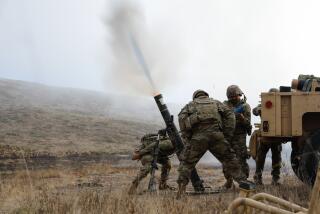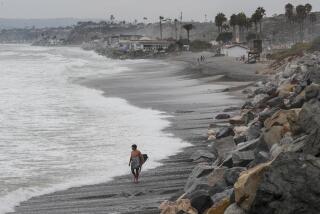Harbor Access Limited Near Weapons Site
Kent Clampitt is a boat guy and a patriot who doesn’t want to be the victim of a terrorist attack.
So when the U.S. Navy restricted his access to the ocean as a way to beef up security at the adjacent Seal Beach Naval Weapons Station, Clampitt was all for it.
“We are at war,” Clampitt, 60, said Saturday as he lounged aboard his 32-foot boat in Huntington Harbour. “That base up there has significant munitions. Whether you support [the restrictions] for patriotic reasons or for personal security reasons, it makes a great deal of sense.”
Here in the harbor, where the water gently laps at the sides of hundreds of gleaming white yachts, are perhaps the first civilians in Orange County to be asked to make a wartime sacrifice.
The Navy has limited access in and out of Anaheim Bay to four hours a day--8 to 10 a.m. and 4 to 6 p.m.--as part of an effort to protect the weapons station.
The controls are to boat owners what increased airport security is to fliers--evidence that in the wake of the Sept. 11 terrorist attacks, life in America will no longer be the same.
“There’s been talk around here for years that we have access to the ocean solely because of the largess of the Navy and that, in the case of an emergency, that access might be taken away,” said Doug Brownell, 58, a semiretired physician who lives with his wife on a 65-foot cruiser. “Well, the emergency is here.”
Security Is Tight Up and Down Coast
Brownell, who just returned to Huntington Harbour from a five-month trip to Alaska, said security is tight up and down the North American coast. He had to wait two days in Canada to get back in the U.S., and was buzzed by the Coast Guard several times.
“Considering the seriousness of the situation, it’s not that much of a big deal,” Mike Vaughn said of the restricted hours in Anaheim Bay.
Vaughn, 55, is an attorney who brokers the sale of ships worldwide. He has lived and worked on his 55-footer, the China Sea, for the last 15 years.
“It’s a lifestyle,” he said. “You either enjoy it or not. If you like it, it’s wonderful.”
There are inconveniences to the life, including limited storage space, cramped quarters, and constant and costly maintenance. Having the Navy as your neighbor--and having it tell you when you can come and go--just adds another wrinkle.
Besides, the Navy was here first. The base opened in 1944 and became a full-fledged weapons station in the 1960s, supplying missiles and other munitions to the Pacific Fleet.
Navy Called Good Neighbor
Through the years, the Navy has been a good neighbor, boat owners say. The military’s vast acreage has kept development of the surrounding wetlands to a minimum. About 1,000 acres of the base is a national wildlife refuge, home to several endangered species of birds.
It’s not known how long access to Anaheim Bay will be restricted. “I wish I could tell you,” said Gregg Smith, public affairs officer for the weapons base. “The decision is going to depend on the international situation.”
Not everyone is happy with the Navy’s new hours, of course. Talk is that some boat owners have begun looking to rent slips elsewhere.
“Some people think it’s an overreaction,” said Tony Myrell, 47, who pays almost $600 a month for his liquid slice of paradise. “There’s a lot of money sitting in this harbor.”
Myrell sees his boat as his weekend condominium. “Sometimes, you’d like to move the condo.”
And sometimes you have to repair the condo.
That’s what Frank Hsu was doing Saturday--engine work, plumbing, replacing hardware.
In summer, Hsu would want to get his fishing boat on the ocean before 5 a.m. to catch the tuna running. But it’s fall, the water is cooling off, the tuna have moved on, and even if they hadn’t, the Navy wouldn’t let Hsu out until 8 a.m. anyway.
“It’s understandable,” the 36-year-old Fountain Valley man said of the new hours as he sanded his deck.
“The boating season is coming into the slow period anyway. I think people might think differently about it if it happened during the height of summer.”
More to Read
Sign up for Essential California
The most important California stories and recommendations in your inbox every morning.
You may occasionally receive promotional content from the Los Angeles Times.









